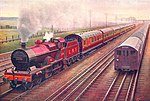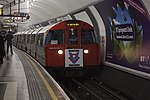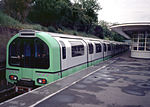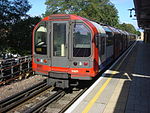
Electric multiple units have operated on the London Underground since 1898, and exclusively since 1961. They are of two sizes, smaller deep-tube trains and larger sub-surface trains that are of a similar size to those on British main lines.
The Waterloo & City line opened in 1898 with electric multiple units, and the later tube railways followed, using trains that were known as gate stock, as access was via lattice gates at each end of each car. The earlier railways had electrified the underground sections by 1907. Pneumatic sliding doors were introduced on tube trains in 1920 and sub-surface trains in the late 1930s. Until the early 1960s an electric locomotive was exchanged for a steam locomotive on the Metropolitan line beyond Rickmansworth. The Victoria line opened in the late 1960s using Automatic Train Operation (ATO), and the last train with a guard ran in 2000.
Sub-surface stock
Before 1933 the sub-surface lines were run by two companies, the District Railway and Metropolitan Railway. As the Circle line was operated jointly, they collaborated in building a prototype in 1900.
| Stock | Image | Entered service | Withdrawn | Line(s) | Notes |
|---|---|---|---|---|---|
| Joint Prototype |  |
1900 | 1900 | District | A 6-car train, 3 cars owned by each company |
District Railway
See also: District Railway electric multiple unitsInitially District Railway cars were compatible, except for A Stock, and trains were made up from cars of any age, until the incompatible F Stock arrived in 1920. The District classified its rolling stock using letters of the alphabet in 1925, before the fleet was rebuilt, forming main line and local pools. The H Stock designation was used in 1925 for rebuilt B Stock cars and by LT in the 1930s for the remaining cars with hand-operated doors.
| Stock | Introduced | Withdrawn | Notes |
|---|---|---|---|
| A Stock | 1903 | 1925 | Two prototype 7-car trains. |
| B Stock | 1905 | — | Motor cars converted into 1926 H Stock. |
| C Stock | 1911 | — | Rebuilt 1926–30, reclassified as 1938 H Stock by LT. |
| D Stock | 1912 | — | Rebuilt 1926–30, reclassified as 1938 H Stock by LT. |
| E Stock | 1914 | — | Rebuilt 1926–30, reclassified as 1938 H Stock by LT. |
| F Stock | 1920 | 1963 | Incompatible with the other District Railway trains, transferred to the Metropolitan line in the 1950s |
| G Stock | 1923 | 1959 | Converted to Q23 Stock except for the single G23 cars that operated South Acton shuttles. |
| H Stock | 1926 | 1923–35 | Converted B Stock cars |
| K Stock | 1927 | — | Converted to Q Stock from 1937 |
| L Stock | 1931 | — | Converted to Q Stock from 1937 |
Metropolitan Railway
See also: Metropolitan Railway electric multiple unitsThe Metropolitan Railway used both Westinghouse (BWE) and Thomson-Houston (BTH) control equipment, making the cars incompatible. Originally cars had a saloon layout, but after 1906 surplus bogie compartment carriages built in 1898 and 1900 were converted. Compartment stock was introduced on Watford services after 1927.
| Class | Introduced | Withdrawn | Formation | Motor cars | Comments |
|---|---|---|---|---|---|
| V | 1905 | from 1936 | 7-car | 150 BWE 200 BTH |
The original electric rolling stock, built in 1904–06. |
| Hammersmith & City | 1906 | from 1937 | 6-car | 150 BTH | Jointly owned with the Great Western Railway. Some trains lent to the Mersey Railway 1942–45. |
| W | 1906 | by 1939 | 5-car to 8-car | 1927/30/31 | Bogie stock trailers that ran with 150 BWE motor cars before converted to run with the 200 BTH motor cars. Converted to run with motor cars from the MW pool in 1927. |
| M | 1906 | by 1939 | 7-car, then 8-car | 200 BTH | Bogie stock conversion |
| N | 1906 | 1939 | 6-car, then 4-car | 150 BWE | Bogie stock conversion |
| Circle | 1913/21 | 1950 | 5-car | 200 BTH 200 BWE |
Refurbished after 1933, when the motors were replaced. |
| Hustle S |
1919/25 | 8-car | Experimental compartment stock with swing doors, and motor cars with electro-pneumatic control equipment | ||
| MV | 1927–29 | — | 7-car | 1927 | Compartment stock, the MV stock trailers rebuilt from carriages. Converted in 1935 and reclassified T Stock in 1938. |
| MW | 1929–33 | — | 8-car | 1927/30/31 | |
London Transport
In 1933 the Metropolitan and District railways were merged with the other underground railways, tramway companies and bus operators to form the London Passenger Transport Board (LPTB), which continued the District Railway classification system.
| Stock | Image | Entered service | Withdrawn | Line(s) | Notes |
|---|---|---|---|---|---|
| H Stock | — | 1957 | District | Second use of the designation, for District Railway trains that remained with hand-operated doors. | |
| M/N Stock | 1935 | — | Hammersmith & City District |
Converted to Q Stock in 1937 | |
| O/P Stock |  |
1937 | 1981 | Circle, Hammersmith & City, Metropolitan, East London and District |
Converted to CO/CP stock in the 1950s. |
| Q Stock |  |
1938 | 1971 | District East London |
District Railway cars built after 1923 with new Q38 cars. |
| R Stock |  |
1950 | 1983 | District | Q38 cars formed with new cars. |
| T Stock |  |
1938 | 1962 | Metropolitan | Converted from Metropolitan Railway compartment stock |
| A Stock |  |
1961 | 2012 | Metropolitan East London |
|
| C Stock |  |
1970–78 | 2014 | Circle District Hammersmith & City |
|
| D Stock |  |
1980–83 | 2017 | District | |
| S Stock |  |
2010–17 | In service | Metropolitan (2010–current) Hammersmith & City (2012–current) Circle (2013–current) District (2013–current) |
In service |
Great Northern & City
The Great Northern & City Railway (now the Northern City Line) was a tube built in the early 20th century with an internal diameter of 16 feet (4.9 m) to take main-line trains.
| Stock | Entered Service | Withdrawn | Line(s) | Notes |
|---|---|---|---|---|
| GN&C Stock | 1904 | 1939 | Northern City Line | Replaced by Standard Stock |
Tube stock
The deep-level tubes use smaller trains that run in two circular tunnels with a diameter of about 11 feet 8 inches (3.56 m).
| Stock | Image | Entered Service | Withdrawn | Line(s) | Notes |
|---|---|---|---|---|---|
| Original Waterloo & City line stock | 1898 | 1940 | Waterloo & City | ||
| 1903 Stock |  |
1903 | 1939 | Central | Central London Stock, with trailers rebuilt from locomotive hauled cars that entered service in 1900. Refurbished in 1926–28. |
| Gate Stock |  |
1906 | 1930 | Bakerloo, Northern, Piccadilly | Except for two cars that ran on the Aldwych branch and were scrapped in 1956. |
| 1914 Stock | 1914 | circa 1935 |
Bakerloo | For the extension to Paddington | |
| 1915 Stock | 1917 | Bakerloo, Central | Motor cars, used on the Bakerloo line until replaced by Joint Stock in 1920/21. Refurbished with the rest of the Central London Stock in 1926–28. | ||
| Watford Joint Stock |  |
1920 | 1930–31 | Bakerloo | Jointly owned with the London & North Western Railway, and replaced by Standard Stock with air-operated doors. Three 3-car sets were modified for use by the LMSR on the Watford Junction-Rickmansworth and Croxley Green shuttles. These were withdrawn in 1939. |
| 1919/22 Stock | 1920 | 1938 | Bakerloo, Piccadilly | First trains with air-operated doors | |
| Standard Stock |  |
1923 | 1966 | Bakerloo, Central, Northern, Piccadilly, Northern City Line | Also known as pre-1938 Standard Stock trains ran on the Isle of Wight 1967–92. |
| 1935 Stock | 1935 | 1976 | Four six-car prototypes, some with air-conditioning and stream-lining. Non-streamlined units converted into two cars in 1940 | ||
| 1938 Stock |  |
1938 | 1988 | Bakerloo, Piccadilly, Northern, Northern City Line, East London | Withdrawn in 1985, but five trains re-entered service the following year to allow stock to be converted for One Person Operation. In 1989 some trains were sold to replace Standard Stock on the Isle of Wight. |
| Waterloo & City 1940s stock |  |
1940 | 1993 | Waterloo & City | |
| 1949 Stock | 1951 | 1978 | Bakerloo, Northern, Piccadilly | To supplement 1938 Stock | |
| 1956 Stock |  |
1957 | 2000 | Bakerloo, Northern, Piccadilly | Prototype trains with unpainted aluminium bodies. |
| 1959 Stock | 1959 | 2000 | Central, Bakerloo, Northern, Piccadilly | Minor changes from 1956 Stock | |
| 1960 Stock |  |
1960 | 1994 | Central | Prototype motors cars that ran with converted pre-1938 Stock, then converted 1938 Stock. |
| 1962 Stock |  |
1962 | 1999 | Central, Piccadilly, Northern | Compatible with 1959 Stock. |
| 1967 Stock |  |
1968 | 2009–11 | Victoria | |
| 1972 Stock |  |
1972–75 | In service | Bakerloo | |
| 1973 Stock |  |
1975–78 | In service | Piccadilly | |
| 1983 Stock |  |
1984 | 1997–98 | Jubilee | |
| 1986 Stock |  |
1986–87 | 1989 | Jubilee | Prototypes |
| 1992 Stock |  |
1993–95 | In service | Central, Waterloo & City | |
| 1995 Stock |  |
1997–2000 | In service | Northern | |
| 1996 Stock |  |
1997–1998 | In service | Jubilee | |
| 2009 Stock |  |
2009–2011 | In service | Victoria |
References
Notes
- Bruce 1988, p. 113.
- Green 1987, pp. 20–21.
- Bruce 1988, pp. 37–44.
- Green 1987, pp. 24–26.
- ^ Bruce 1988, pp. 49–52.
- Bruce 1983, p. 97.
- Day & Reed 2010, p. 159.
- Green 1987, pp. 57–58.
- ^ Day & Reed 2010, p. 205.
- ^ Bruce 1983, pp. 27–29.
- Bruce 1983, p. 69.
- Bruce 1983, p. 78.
- Bruce 1983, p. 82.
- Bruce 1983, p. 85.
- Bruce 1983, pp. 82, 96.
- Bruce 1988, pp. 30–32.
- Bruce 1988, pp. 28, 35–36, 85.
- ^ Bruce 1988, pp. 68, 85, 88.
- ^ Bruce 1988, p. 96.
- Bruce 1988, pp. 78–81.
- Bruce 1988, pp. 82–84.
- Bruce 1988, pp. 85–88.
- Bruce 1988, p. 85.
- Bruce 1988, p. 88.
- Bruce 1983, pp. 37–39, 76.
- Bruce 1983, pp. 42–43.
- Bruce 1983, pp. 23, 56, 72–73.
- Bruce 1983, p. 23, 56.
- Bruce 1983, pp. 56–57.
- Bruce 1983, pp. 64–64, 71, 76–77.
- Bruce 1983, pp. 70–72.
- Bruce 1983, pp. 72–75.
- Horne 2006, p. 63.
- Bruce 1983, pp. 96–97.
- Bruce 1983, p. 89.
- Bruce 1983, pp. 90–95.
- Bruce 1983, pp. 96–95.
- Horne 2006, p. 75.
- Bruce 1983, pp. 98–103.
- Bruce 1983, pp. 72–74.
- Hardy, Brian (2002). London Underground Rolling Stock (15th ed.). Capital Transport. p. 36. ISBN 1854142631.
The first train of A60 stock entered passenger service on 12 June 1961 (units 5004 and 5008).
- "Last A stock rail tour". Past Events. London Transport Museum. Retrieved 5 May 2013.
- ^ "Rolling Stock Data Sheet" (PDF). Transport for London, archived at What do they know. March 2007. Retrieved 21 September 2014.
- "Last day in service for the C-stock as modern air-conditioned trains introduced" (Press release). Transport for London. 3 June 2014. Archived from the original on 13 July 2014.
- "Our Upgrade Plan (leaflet)" (PDF). Transport for London. February 2013. Archived from the original (PDF) on 17 July 2013. Retrieved 16 March 2013.
- "Rolling Stock: D Stock". Transport for London. Retrieved 16 March 2013.
- "Rolling Stock: S Stock". Transport for London. Archived from the original on 29 December 2013. Retrieved 16 March 2013.
- ^ Day & Reed 2010, p. 131.
- Croome & Jackson 1993, p. 71.
- Bruce 1988, pp. 17, 23.
- Bruce 1988, p. 25.
- Bruce 1988, p. 36.
- Bruce 1988, p. 29.
- Bruce 1988, pp. 32–35.
- Bruce 1988, p. 37.
- Croome & Jackson 1993, p. 204.
- Bruce 1988, p. 45.
- Bruce 1988, pp. 32, 47.
- ^ Croome & Jackson 1993, p. 205.
- Bruce 1988, p. 47.
- Bruce 1988, pp. 53, 71, 72.
- Croome & Jackson 1993, pp. 355–356, 464.
- Bruce 1988, pp. 73–76.
- Day & Reed 2010, p. 192.
- Bruce 1988, pp. 77–82.
- Croome & Jackson 1993, p. 464.
- Bruce 1988, pp. 23–24.
- Day & Reed 2010, p. 198.
- Croome & Jackson 1993, pp. 313–315.
- Bruce 1988, pp. 87–90.
- Bruce 1988, pp. 93–98.
- Bruce 1988, pp. 91–92.
- Bruce 1988, p. 106.
- Day & Reed 2010, p. 219.
- "Rolling Stock: 1972 Stock". Transport for London. Retrieved 16 March 2013.
- "Rolling Stock: 1973 Stock". Transport for London. Retrieved 16 March 2013.
- Bruce 1988, p. 122.
- Croome & Jackson 1993, pp. 472–473.
- "Rolling Stock: 1992 Stock". Transport for London. Archived from the original on 14 December 2013. Retrieved 16 March 2013.
- "Rolling Stock: 1995 Stock". Transport for London. Archived from the original on 28 October 2012. Retrieved 16 March 2013.
- "Rolling Stock: 1996 Stock". Transport for London. Archived from the original on 22 February 2014. Retrieved 16 March 2013.
- "Rolling Stock: 2009 Stock". Transport for London. Archived from the original on 5 November 2013. Retrieved 16 March 2013.
Books
- Bruce, J. Graeme (1983). Steam to Silver: A history of London Transport Surface Rolling Stock (2nd ed.). London: Capital Transport. ISBN 0-904711-45-5.
- Bruce, J. Graeme (1988). London Underground Tube Stock. Shepperton: Ian Allan and London Transport Museum. ISBN 0-7110-1707-7.
- Croome, D.; Jackson, A. (1993). Rails Through The Clay – A History of London's Tube Railways (2nd ed.). Capital Transport. ISBN 1-85414-151-1.
- Day, John R.; Reed, John (2010) . The Story of London's Underground (11th ed.). Capital Transport. ISBN 978-1-85414-341-9.
- Green, Oliver (1987). The London Underground — An illustrated history. Ian Allan. ISBN 0-7110-1720-4.
- Horne, Mike (2006). The District Line. Capital Transport. ISBN 1-85414-292-5.
External links
| London Underground rolling stock | |||||||||||||||||
|---|---|---|---|---|---|---|---|---|---|---|---|---|---|---|---|---|---|
| Current |
| ||||||||||||||||
| Future |
| ||||||||||||||||
| Former |
| ||||||||||||||||
| Experimental |
| ||||||||||||||||
| Other | |||||||||||||||||
| Miscellaneous | |||||||||||||||||